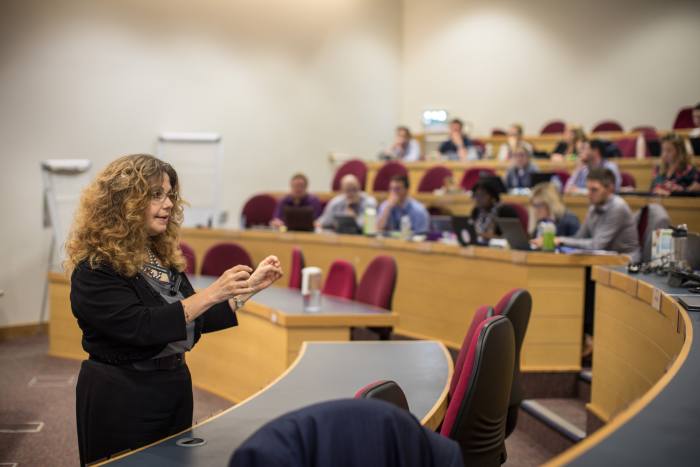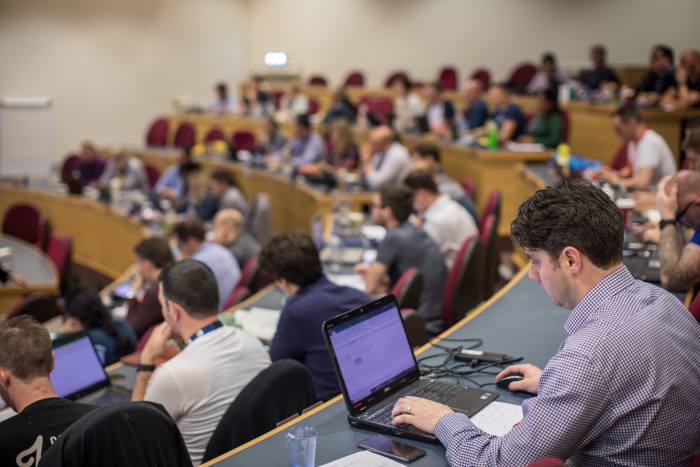Executive MBA Ranking 2022: rising in the east
Business schools in east Asia have strengthened their positions as leading global providers of executive MBAs in the 2022 FT EMBA ranking, despite pandemic and political disruptions.
Three programmes based in the region took the top spots: in order, Kellogg-HKUST in Hong Kong, Ceibs in Shanghai and the Tsinghua-Insead EMBA spanning China and Singapore. Two are run with international partners, while Ceibs has joint European governance and makes frequent use of visiting faculty.
A further four schools in the top tier of 11 have bases in Hong Kong, China or Singapore: Chicago Booth, Washington University: Olin, Trium’s New York University and UCLA Anderson with the National University of Singapore.
The ranking highlights the continued strong performance by schools in the region with global partnerships, and the success of their graduates alongside those attending EMBA programmes in Europe and North America.
FT Executive MBA Ranking 2022

Find out which schools are in our ranking of EMBA degrees. Also learn how the table was compiled and read the rest of our coverage at ft.com/emba.
However, there is uncertainty over the provision of business education for foreign students in east Asia, against a backdrop of coronavirus lockdowns and continuing restrictions on movement, as well as rising geopolitical and trade tensions. There are similar questions around EMBAs from schools in Russia, isolated by its war against Ukraine.
The 2022 ranking comes at a time of changing demands from students and faculty, both for the contents of courses and the way they are taught. The FT’s methodology is based on data provided by business schools and by their alumni three years after completing their programmes.
The ranking takes into account factors including salaries, assessments of career services, aims achieved and the quality of academic research, as well as the gender balance and international diversity of students and faculty.
Prof Ding Yuan, dean of Ceibs, which was founded by the Chinese government and the European Union, says that while demand for its Chinese-language EMBA remained high among domestic students, he has temporarily stopped marketing the global degree to international candidates, given quarantines and visa restrictions.
“It is very complicated for people to travel,” he says. “Chinese demand is very strong, but it is only just starting to open up for student visas for international students. It’s already too late for this year and, for next year we are not yet clear.”
Prof Kai Lung Hui is academic director of the top-ranked Kellogg-HKUST EMBA programme, which has been teaching many of its students remotely, including in Singapore and the US. “Classes are going on as usual and we still give students the highest possible interaction they could have, given Covid restrictions,” he says.
He notes there is rising demand among students for courses offering topics around sustainability and technology, including blockchain, digital contracts, business analytics and fintech.

More broadly, business schools are exploring ways to maintain online formats adopted during the pandemic alongside a return to in-person teaching. The Wharton School of the University of Pennsylvania this year launched one of the first blended global EMBAs among leading schools, priced at the same level as its in-person courses but with about three-quarters offered remotely, mixed with periods in Philadelphia, San Francisco and other locations.
“We were imposing ‘one size fits all’, but there are clearly people who have different preferences, different types of jobs and family situations,” says Brian Bushee, senior vice dean of teaching and learning at Wharton. “We want to tap into those business people who would probably never consider an EMBA in person because of the travel commitments.”
The most recent annual global survey of business education courses by the Graduate Management Admissions Council, which administers the admissions test, showed late last year that just a third of schools reported a growth in applicants.
Digital conference: Spotlight on the Executive MBA

Join global education editor Andrew Jack and business school experts around the world for a free online event on Wednesday October 19, focusing on career impact, insights into the 2022 ranking, and themes from managing disruption to ESG. Register here
The top two schools in the FT ranking also reported the highest alumni salaries, led by Kellogg-HKUST at $584,197, adjusted for international purchasing power parity. Yale School of Management in the US came top in assessments of aims achieved, followed by Iese Business School in Spain and the University of St Gallen in Switzerland.
Schools achieving gender parity among faculty were IE Business School, Koç University Graduate School of Business, IBS-Moscow Ranepa and St Petersburg University Graduate School of Management. The only school to achieve student gender parity is St Petersburg Graduate School of Management, followed closely by University of Maryland: Smith (52 per cent female), French schools Kedge (51) and Rennes (48), plus the University of Washington: Foster (48).
The top EMBA provider for research, based on a ranking of recent publications in leading academic journals, was University of Pennsylvania: Wharton, followed by University of Chicago: Booth, MIT: Sloan, Insead and Northwestern University: Kellogg.
Among those with a focus on environmental, social and governance factors in their curriculum, Iese Business School came top, followed by IE Business School, TBS Education, EMLyon Business School and ESCP Business School.
Of the 85 business schools offering EMBAs that were ranked both this year and last, the average salary was $213,000 in 2021 and rose only modestly to $214,000 in 2022. Total enrolments were up slightly to 7,737 this year, with women accounting for just over a third of the total and international students just over two-fifths.
For all the latest Business News Click Here
For the latest news and updates, follow us on Google News.
